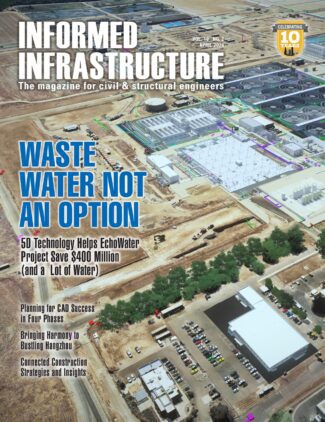Bethesda, Md., Aug. 5, 2013–Thanks to a recent initiative of the ASPRS Lidar Division, different segments of the lidar mapping community now have the ability to customize the LAS file format to meet their application-specific needs. The new mechanism that makes this possible is the LAS Domain Profile, which is a derivative of the base LAS v1.4 specification that adds (but does not remove or alter existing) point classes and attributes.
The Lidar Division is pleased to announce the release of the first LAS Domain Profile, which is designed to support topographic-bathymetric (“topo-bathy”) lidar said Chris Parrish, the Lidar Division's Assistant Director and Lead Physical Scientist with the Remote Sensing Division of NOAA's National Geodetic Survey (NGS). The Topo-Bathy Lidar Domain Profile adds point classification values for bathymetric point (e.g., seafloor or riverbed; also known as submerged topography), water surface, derived water surface, submerged object, IHO S-57 object, and bottom-not-found depth. Extra Byte Variable Length Records (EXTRA_BYTES or Extra Byte VLRs) are added for pseudo-reflectance, uncertainty, water column depth, figure of merit, and processing specific flags. Additional domain profiles are expected in the future, and a LAS Domain Profile Description Template is available online.
Parrish added the coastal lidar community is currently witnessing the emergence of a new class of topo-bathy lidar systems that occupies the middle ground between conventional bathymetric and commercial topographic systems and provides seamless, high-resolution coverage across the backshore, intertidal, and shallow nearshore zones. Many users of these systems and the data they provide are interested in integrating the data into existing topographic lidar processing streams. However, the base LAS specification does not directly support these data. To address this need, the coastal lidar community — including members of the Joint Airborne Lidar Bathymetry Technical Center of Expertise (JALBTCX) — have developed a LAS domain profile for topographic-bathymetric lidar.
The LAS format, which is published and maintained by ASPRS, is the most widely-used, publicly available lidar file format, and has become the de facto industry standard for airborne lidar data. The new point classes and attributes defined in this domain profile further extend its utility by facilitating the production and use of point clouds containing both subaerial (i.e., land) and subaqueous points.
About ASPRS
Founded in 1934, ASPRS is an international professional organization of 6,000 geospatial data professionals. ASPRS is devoted to advancing knowledge and improving understanding of the mapping sciences to promote responsible application of photogrammetry, remote sensing, geographic information systems and supporting technologies.

